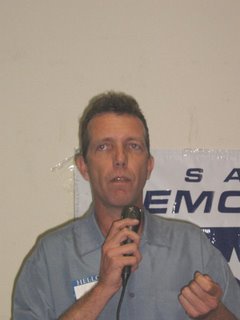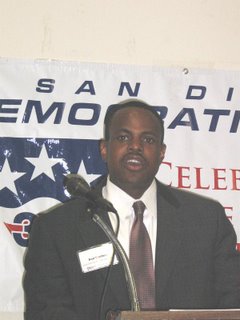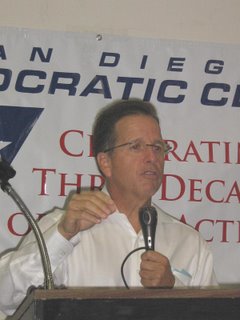


Queer Demos Endorse No on 83, Yes on 89
by MARK GABRISH CONLAN
Photos, top to bottom: Mike Aguirre, Ron Shelton, Maxx Stalheim
Copyright © 2006 by Mark Gabrish Conlan for Zenger’s Newsmagazine • All rights reserved
At its regular meeting September 28 — its last chance to make endorsements before the November 7 elections -— the predominantly Queer San Diego Democratic Club broke ranks with the state Democratic Party on two important propositions on the ballot. The club voted to oppose Proposition 83, which would increase sentences for child sexual abuse, require convicted sex offenders to wear GPS monitoring bracelets for the rest of their lives and prevent them from living within certain specified distances of schools, parks or anywhere children might congregate. The club also voted to support Proposition 89, a so-called “clean money” initiative that would provide public funding for grass-roots candidates to run for office, similar to systems that already exist in Maine and Arizona. The state party had supported Proposition 83 and remained neutral on 89.
While at least one club member strongly urged the club to endorse 83 — “This is the most disgusting crime there is, and we should stand on record against it” — opponents within the club pointed out that it would punish people not only for crimes they actually committed but for crimes they might commit in the future. They also pointed to the nearly $1 billion it would take to monitor all those GPS devices, according to the California attorney general’s analysis of what Proposition 83 would do, and said this would take away resources police departments need to fight real, here-and-now crime. One club member who works with victims of child sex abuse and domestic violence pointed out that, despite the stereotype of pedophiles lurking near children waiting to pick one off for abuse, 90 percent of adults who sexually abuse children are family members, friends or otherwise known to their victims in advance. She also said that measures like 83 make child sex abuse a criminal-justice problem, when it should be regarded as a mental illness and treated accordingly.
The club supported public financing of elections despite complaints from some members, including former club president Craig Roberts, that the financing would come exclusively from a new tax on corporations. “Why are corporations the only ones being asked to pay for this?” Roberts said. Members in support of Proposition 89 noted that in the states where similar laws are in effect now it had opened the political process to grass-roots candidates without either personal fortunes or rich campaign contributors, and had enabled Democrat Janet Napolitano to become governor of Arizona even though she could not have afforded to run a competitive race using private money. The club endorsed 89 by a vote of 18 to one, with two members abstaining.
The meeting also featured extensive debate on Propositions 1A through 1E, the multi-billion dollar bond package for infrastructure improvements worked out by Republican governor Arnold Schwarzenegger with the Democratic majority in the state legislature. Proposition 1A isn’t actually a bond measure, but a proposal to restrict the state from spending gasoline taxes on anything but transportation-related programs. Of the other measures, 1B would provide $19 billion in bonds for freeways, roads, bridges and some money for public transit (the latter put in at the insistence of Democrats in the legislature — Schwarzenegger and the Republican legislators had wanted to restrict the funding to freeways and roads alone); 1C would provide $2.85 billion for affordable housing; 1D would provide $10.4 million to build and refurbish schools and colleges; and 1E would provide $4.09 billion to strengthen levees on the Sacramento river and for flood-control projects in general.
Part of the debate on the bond measures centered around the fact that it costs twice as much money to build something with borrowed bond money as it would cost if you could finance it on a pay-as-you-go basis. Club members also expressed concern over the amount of money the state has borrowed over the past four years to pay current operating expenses, and the whopping debt this generation of California lawmakers is already bequeathing to the future even if this year’s infrastructure bonds lose. One member said that as long as the state discriminates against Queer couples by not allowing them to marry, Queer voters should not grant the state any additional borrowing authority but should instead ask, “What’s in it for us?” Nonetheless, despite the misgivings, the club eventually voted to endorse four of the five measures in the bond package and take no position on 1B,the transportation bonds. The state Democratic Party had endorsed them all.
On other state measures, the club voted to support Proposition 86, which would increase the taxes on tobacco to fund emergency-room services and other health-related programs, and to oppose two other propositions: 88, which would tax every California property owner $50 per parcel to increase state funding for education; and 90, which would impose new restrictions on the state’s right to take property by eminent domain. While a number of club members were sympathetic to the ostensible purpose of 90, which is to protect the rights of individual property owners from the effects of the U.S. Supreme Court’s Kelo decision — which essentially allows state and local governments to take people’s property if a developer wants to build a business on the site that will generate more tax revenue — they pointed to what several members called the “Trojan horse” character of the measure.
One of 12 initiatives on various state ballots financed by New York developer Howard Rich and his organization, Americans for Limited Government, Proposition 90 would write the doctrine of “regulatory takings” into California law. “Regulatory takings” means that the government would have to compensate private property owners not only for actually seizing their land to use for a public purpose — like building a road, park, school or hospital — but for the loss of potential profits from any government regulation of their property, including environmental protection, zoning laws or health and safety regulations. Former County Supervisor candidate Richard Barrera said passage of Proposition 90 would effectively abolish the California Environmental Quality Act (CEQA), which for nearly 30 years has required developers to file environmental impact reports before they can build projects — and allowed government either to block a project or to demand so-called “mitigation” of any adverse environmental effects before the developer can build. The club’s vote against Proposition 90 was 20 to three, with one abstention; the vote against 88 was 14 to nine.
The club opposed three measures on the local ballot in San Diego but supported a local $870 million bond measure to build and refurbish buildings on community college campuses. The measures the club opposed were Proposition A, a nonbinding vote directing the city to work towards building a new civilian airport at Miramar; and the two initiatives San Diego mayor Jerry Sanders is pushing as his solution to the city’s pension crisis. One, Proposition B, would require voter approval of any further increase in city workers’ pension benefits; the other, Proposition C, would allow the city to outsource work to private companies — which opponents fear would not only gut workers’ pensions but lower their wages as well.
The lengthy debate on the propositions tended to overshadow the club’s featured speaker, San Diego city attorney Mike Aguirre. Taking pride in the Wall Street Journal editorial page’s denunciation of him as a “liberal Democrat,” Aguirre staunchly defended his record in court, where he has filed several cases attempting to have some of the city’s increases in workers’ pensions declared illegal on the ground that the city had no money to pay them. He said the reason the local media in general and the San Diego Union-Tribune in particular had portrayed his efforts as unsuccessful was because “the Union-Tribune is run by politicians, supported mainly by the car industry, and read mostly for the sports pages.”
Contrary to the impression given by the Union-Tribune — and by other media who take their cues from it — that Aguirre is getting his clock cleaned in court on the pension litigation, Aguirre said, “We have been successful in court. Even the Kroll report [the audit by a New York bond firm for which the city paid $20 million to be let back into the municipal bond market] agreed the benefits were illegal. The U.S. Securities and Exchange Commission [SEC] is making findings supportive of what I have found. The only office in the city that has come up with a plan to get our financial house in order has been the city attorney’s office, a year and a half ago. Why do we need to do this? We have disintegrating wastewater treatment, a water system without proper capacity for cleansing, storm drains overflowing in Chollas Park, no secondary sewage treatment for wastewater, and our roads and streets are getting worse every day.”
The club also heard from two candidates for office, Mark Hanson — who’s running for State Senate against Dennis Hollingsworth in a heavily Republican district — and Maxx Stalheim, openly Gay candidate for City Council in Imperial Beach. The club endorsed both candidates and also heard from Ron Shelton, whom the club had already endorsed for Superior Court judge against a Republican who had written letters to county supervisors Pam Slater, Ron Roberts and Greg Cox — all Republicans — denouncing them for endorsing Shelton and calling Shelton a “liberal Democrat” and a member of the American Civil Liberties Union and La Raza. He explained that he belongs to neither of those groups, though he is a member of La Raza Lawyers’ Association.